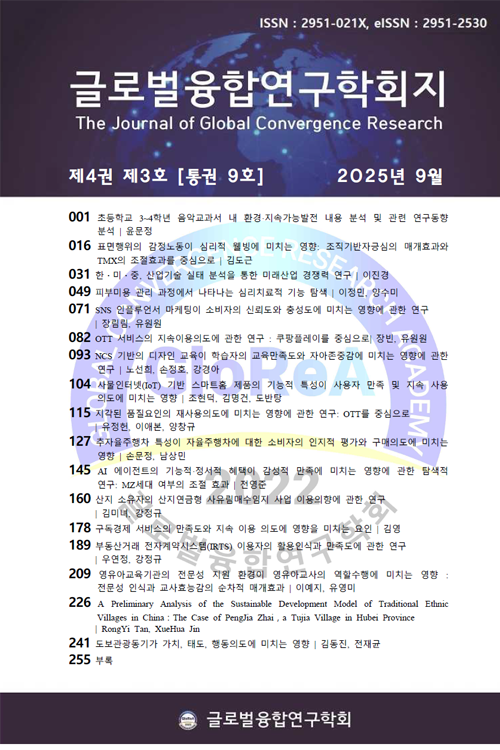- 영문명
- A Study on Users’ Perceptions and Satisfaction with the Intelligent Real Estate Transaction System
- 발행기관
- 글로벌융합연구학회
- 저자명
- 우연정(YEON-JEONG WOO) 강정규(JEONG GYU KANG)
- 간행물 정보
- 『글로벌융합연구학회지』제4권 제3호, 189~208쪽, 전체 20쪽
- 주제분류
- 복합학 > 학제간연구
- 파일형태
- 발행일자
- 2025.09.30

국문 초록
본 연구는 부동산거래 전자계약시스템(IRTS)의 활용인식과 만족도를 실증적으로 분석하여 제도의 안정적 정착과 확산 요인을 규명하고자 하였다. IRTS는 디지털 전환과 부동산 시장의 투명성·효율성 제고 요구 속에서 기존 대면거래 방식의 복잡한 절차, 높은 비용, 시간 소요를 해소하기 위한 제도로 도입되었으나, 실제 현장에서는 활용이 충분히 확산되지 못하고 있다. 이에 따라 본 연구는 단순한 제도 도입 논의에서 벗어나 이용자의 실제 경험과 인식, 만족도 형성과정을 심층적으로 탐구하였다. 연구의 이론적 기반으로는 계획행동이론(TPB), 혁신확산이론(IDT), 기대일치이론(ECM)을 적용하였다. 이를 통해 태도, 규범, 지각된 행동통제력, 상대적 이점, 복잡성, 기대와 경험의 일치 여부가 만족도와 재이용 의도에 어떤 영향을 미치는지 설명하고자 하였다. 연구 설계에서는 기술적 요인(안정성, 보안성, 접근성, 편리성), 심리적 요인(신뢰도, 기대감), 제도적 요인(법적 신뢰, 행정 연계, 인센티브, 정책 지원 및 홍보), 인지적 요인(이해도, 효용성, 경제성)을 독립변수로, 만족도를 종속변수로 설정하였다. 자료는 일반 이용자 설문과 전문가 조사를 병행하여 수집되었으며, SPSS를 활용한 요인분석, 분산분석, 회귀분석과 AHP 기법을 통해 분석하였다. 분석 결과, 낮은 활용률은 단순한 기술 부족보다는 법적 안정성에 대한 불확실성, 낮은 인지도, 비직관적 인터페이스, 고령층 및 디지털 취약계층의 접근성 문제 등 제도적·심리적·인지적 요인에서 비롯됨이 확인되었다. 반면, 시스템 안정성, 편리성, 보안성은 만족도에 긍정적으로 작용하였다. 또한 전문가 평가에서는 법적 신뢰 확보와 교육·홍보 강화가 제도의 성공적 확산을 좌우하는 핵심 요인으로 강조되었다. 정책적 시사점으로는 단기적으로 인센티브 제공을 통한 이용 촉진, 장기적으로 법적·제도적 기반 확립과 체계적 교육·홍보 제도의 강화가 필요하다. 본 연구는 부동산거래 전자계약시스템의 확산이 기술적 안정화에 더해 제도적 기반과 사회적 수용성 확보를 통해 가능함을 보여주며, 향후 정책 설계와 실무 적용을 위한 기초 자료를 제공한다.
영문 초록
This study empirically analyzes user perception and satisfaction with the Intelligent Real Estate Transaction System (IRTS) to identify the key factors for its stable settlement and diffusion. The IRTS was introduced in response to digital transformation and the growing demand for transparency and efficiency in the real estate market, aiming to simplify face-to-face transaction procedures, reduce costs, and save time. However, its adoption in practice has remained limited. Accordingly, this study explores not only the introduction of the system itself but also the processes through which users experience, perceive, and form satisfaction with IRTS. The research framework is grounded in the Theory of Planned Behavior (TPB), Innovation Diffusion Theory (IDT), and the Expectation Confirmation Model (ECM). These frameworks explain how attitudes, subjective norms, perceived behavioral control, relative advantages, complexity, and the alignment between expectations and actual experiences influence satisfaction and intention to reuse. Independent variables included technical factors (stability, security, accessibility, convenience), psychological factors (trust, expectations), institutional factors (legal reliability, administrative linkage, incentives, policy support and promotion), and cognitive factors (understanding, perceived usefulness, cost effectiveness), while satisfaction was set as the dependent variable. Data were collected through nationwide user surveys and expert assessments, and analyzed using factor analysis, ANOVA, regression analysis with SPSS, and the Analytic Hierarchy Process (AHP). The results reveal that low utilization of IRTS is due less to technical insufficiency than to institutional, psychological, and cognitive barriers such as uncertainty about legal reliability, low awareness, unintuitive interfaces, and accessibility issues among elderly or digitally vulnerable groups. In contrast, stability, convenience, and security were found to positively influence satisfaction. Expert evaluations further highlighted that securing legal credibility and strengthening education and promotion are the most critical determinants of successful diffusion. Policy implications suggest a two-track strategy: short-term provision of incentives to encourage adoption, and long-term reinforcement of legal and institutional foundations combined with systematic education and promotion. This study demonstrates that the diffusion of IRTS requires not only technological stability but also legal, institutional, and social acceptance, thereby providing practical insights for policy design and implementation in the digital transformation of real estate transactions.
목차
1. 서론
2. 이론적 배경
3. 연구의 설계
4. 부동산거래 전자계약시스템 만족도에 관한 실증분석
5. 결론
References
키워드
해당간행물 수록 논문
참고문헌
최근 이용한 논문
교보eBook 첫 방문을 환영 합니다!

신규가입 혜택 지급이 완료 되었습니다.
바로 사용 가능한 교보e캐시 1,000원 (유효기간 7일)
지금 바로 교보eBook의 다양한 콘텐츠를 이용해 보세요!


